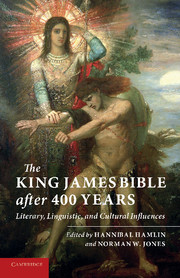Book contents
- Frontmatter
- Contents
- List of Figures
- List of Illustrations
- List of Contributors
- Acknowledgments
- Introduction
- Part I The Language of the King James Bible
- Part II The History of the King James Bible
- 3 The materiality of English printed Bibles from the Tyndale New Testament to the King James Bible
- 4 Antwerp Bible translations in the King James Bible
- 5 Philip Doddridge’s New Testament
- 6 Postcolonial notes on the King James Bible
- 7 From monarchy to democracy
- Part III Literature and the King James Bible
- Chronology of major English Bible translations to 1957
- Chronology of English Bible translations since 1957
- Select bibliography on the King James Bible
- Index of Bible quotations
- General index
- References
6 - Postcolonial notes on the King James Bible
Published online by Cambridge University Press: 05 May 2014
- Frontmatter
- Contents
- List of Figures
- List of Illustrations
- List of Contributors
- Acknowledgments
- Introduction
- Part I The Language of the King James Bible
- Part II The History of the King James Bible
- 3 The materiality of English printed Bibles from the Tyndale New Testament to the King James Bible
- 4 Antwerp Bible translations in the King James Bible
- 5 Philip Doddridge’s New Testament
- 6 Postcolonial notes on the King James Bible
- 7 From monarchy to democracy
- Part III Literature and the King James Bible
- Chronology of major English Bible translations to 1957
- Chronology of English Bible translations since 1957
- Select bibliography on the King James Bible
- Index of Bible quotations
- General index
- References
Summary
The English race is emphatically “The people of the Book” – and that book an alien one.
James BaikieIn truth, I do not know what this book is, but I perceive that everything in it is against us.
W. J. HeatonWhere is the white man’s Book of Heaven?
Helen Barrett MontgomeryOn the Richter scale of English national affection, the King James Bible (KJB) is way at the top like the late Queen Mother. The lovers of the KJB often lapse into quasi-spiritual terminology when extolling its virtues and achievements. Listen to the words of William Canton, the passionate historian of the Bible Society: “The blind had a new world opened to them. Hospitals were supplied with small volumes suitable for the sick-wards, and many a little book was afterwards found under the pillow of the dead. In prisons, penitentiaries, workhouses, the Bible wrought wonders.” Those of a generation that knew the Bible would have readily recognized this as a reworking of what is now known as the Nazareth Manifesto recorded in Luke’s gospel (Luke 4:16–21). The reported words of Jesus have been re-sacralized in order to applaud the emancipatory potential of the English Bible. A new and intimate contact with the divine has been established through the real presence of the KJB. The Galilean has found his voice again in this English book, and the sterling liberative program of Luke’s Jesus is now seen as the work of the Englishman’s book.
- Type
- Chapter
- Information
- The King James Bible after Four Hundred YearsLiterary, Linguistic, and Cultural Influences, pp. 146 - 163Publisher: Cambridge University PressPrint publication year: 2010
References
- 1
- Cited by



